Warning: There will be spoilers. And zombies. But mostly spoilers.
The Walking Dead marketing materials advertise a pretty cool zombie show, and the Walking Dead comic book is a pretty cool zombie comic book. But the first six episodes of The Walking Dead, didn’t constitute a pretty cool zombie show. Partly, the show wasn’t cool enough (the finale would have been terrible even if the show were called The Walking Room That Arbitrarily Kills You With Napalm After You Argue About It For Twenty Minutes). More importantly, it wasn’t zombie enough.
The marketing material for The Walking Dead looks like this:
And the early Walking Dead comic book looks like this (although the artist is replaced shortly after the part of the story portrayed so far in the TV show, which is just a few issues):
While The Walking Dead the TV show looks more like this:
Or this:
After I while, I got to thinking that the show is really a lot less like this:
And a lot more like this:
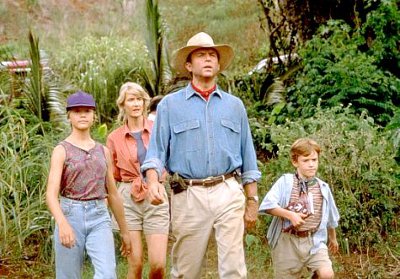
Plucky family of adventurers fighting to survive and stay together in a bright place with lots of color.
The pants are no longer pleated and the monsters look less like lizards, but The Walking Dead the TV show seemed to be modeled much less on zombie/survival culture and much more on adventure/monster/survival culture – specifically safari-ish stories like Jurassic Park.
This is a weightier, more complex issue than just the art direction, costumes, photography and set design (which are of course not clearly defined or conclusive across genres) — it speaks to the heart of what zombie stories are about and why they captivate the way they do. More on this, and on why shambling corpses and carnivorous lizards aren’t always that different, after the jump —
Tell it to the Giant Snakes
Okay, so, thought experiment time. Let’s say we wanted to put the following scene in The Walking Dead. What parts of it would we have to change?
http://www.youtube.com/watch?v=-H6q7F1jnR0
As you can probably tell because you are a connoisseur of fine film, this scene is from Anaconda 3: The Offspring, a made-for-TV monster movie starring David Hasselhoff (subtitled in German, ‘natch, because Germans love David Hasselhoff). And the answer to the question is – everything except the shots of the giant snake would fit right in an episode of The Walking Dead. This is unfortunate, because the cast of Anaconda 3 looks ridiculous:
Good thing there’s nobody on The Walking Dead who looks as silly and patently cliche as David Hasselhoff.
Actually, no, it turns out that there is a guy on The Walking Dead who looks and acts quite a bit like David Hasselhoff (though the ‘Hoff has gone back and forth on chest shaving).
The pictures illustrates the underlying point: this is a generic scene about surviving in a place where you think you ought to be safe, but you aren’t, because you are relatively isolated and there is a monster. There is nothing in the scene that specifically dictates the monster has to be a snake. You could take the monster out and replace it with any number of other monsters, and the story would function the same way.
Think of the times the people in The Walking Dead come upon or fight zombies. Usually it’s a supply raid, a rescue party, or a defense of the home base.
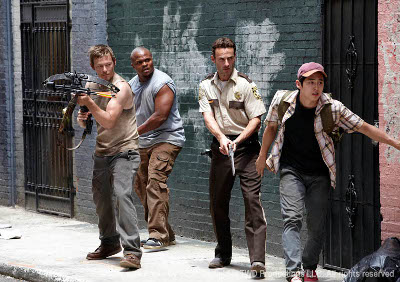
For people whose world has fallen apart and are supposed to be "mismatched," they are awfully great at keeping a level head while running complex urban tactical combat operations.
The relationship between the camp and the city of Atlanta are even similar to the situation in Jurassic Park – you have a place that’s perceived to be safe, but is only sort of safe, and people have to go to some sort-of-faraway place that would normally be easy to get to, but is dangerous because there are monsters. The challenge is to get there, do what you need to do, and get back whilst not being taken down, and before the monsters overwhelm home base.
This isn’t the apocalypse, it’s capture the flag.
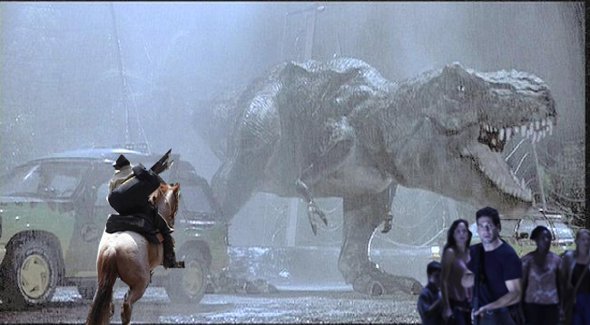
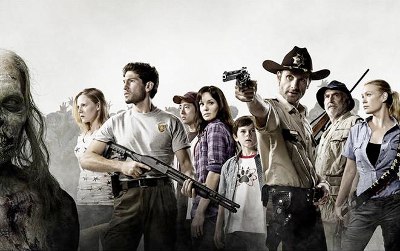
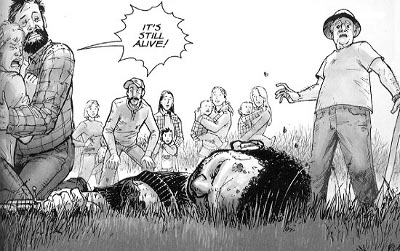
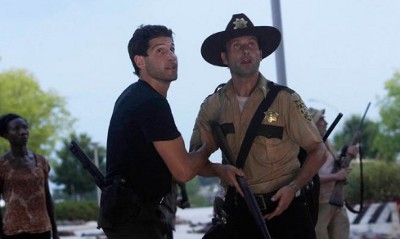
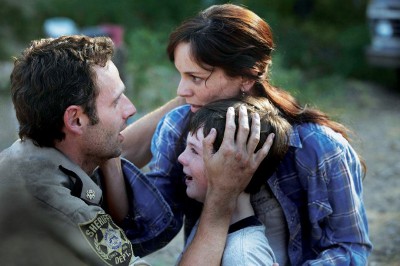
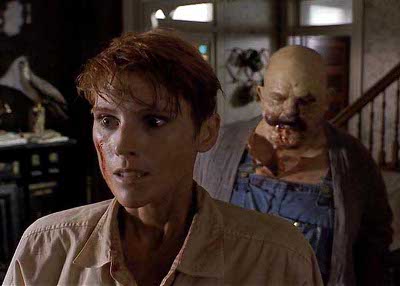
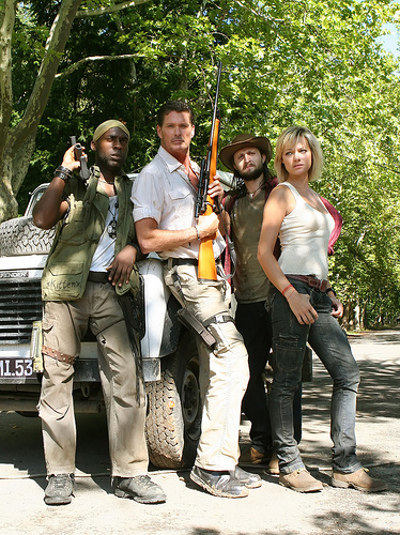
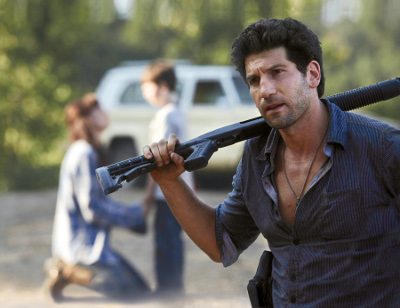
WELL ACTUALLY, the Anaconda clip isn’t subtitled in German. It looks like Dutch or something.
Just thought you should know.
NOTED!
A solid well-actually! Well done!
Damn, you beat me to it.
Well actually, the clip is subtitled in Swedish.
… and the Swedes love the Hoff as well. They have a sincere appreciation for all things kitch.
Great analysis by the way. I’d like to point out one further miss the TV show made – the structure.
The comic book had a pretty clear structure in every number. It’s the same structure as soap operas have:
you start in media res of a big, scary dramatic situation, which is quickly resolved.
You then stumble upon some other, smaller problems, resolve them and everything is great. A love-scene on a bear rug in front of a fire would fit here.
Just before the end a big problem appears, e.g. flesh-eating zombies or mustache-sporting evil twin with a pistol (depending on the show), and the episode ends on a cliff-hanger.
Repeat until cancelled
Twin Peaks pulled it of.
Is Frank Darabont above using the soap opera structure? Shame on him.
Also, the show has flashbacks.
And the “abandon all hope” -thingy came to soon.
Oh, and the “motivation” of the zombies was explained.
Anyways, I’m not looking forward to the next season.
I think the Walking Dead will definitely get more futile as it goes forward. The last episode was important because CDC was supposed to be last chance for humanity to return to normal. Now that they know for a fact that the CDC will not save humanity, nor will any of its counterparts in any other countries, I think you will see a darker tone going forward. i think a major part of the discussion that is missing is the fact that this is a television show, and you were comparing it to movies. Even though movies are more geared towards sequels now than they were in the past, for the most part, movies still have to be self-contained entities. Everything happens in that hour and a half and that’s it. I say give Walking Dead more time. It would be like complaining that Dexter is not as dark or serious as American Psycho. The TV format allows for longer stretching of the storyline, so you see a lot more minutiae and detail than you would in movie, a lot of which seems formulaic and unimportant. Then again, this is TV were talking about. As long as the show gets good ratings, they will drag the storyline out forever.
Yeah, the show could go forward any number of ways. For good or for ill, they’ve abandoned the plot of the source material and ended the season with none of the characters who are still alive committed to doing anything in particular. So they could go anywhere and do anything. It’s one of those endings where you could start the next season with 70% new actors in a totally different situation and it wouldn’t be that much of a surprise.
I hope next season has more people approaching, then fleeing from, cities. Didn’t get enough of that this time.
Thank you for this great analysis, although I have to concur with dewfish: I also have continuing high hopes for this show. I would love to point out the parts of the comics that IMO are perfectly suited for a TV show, but I don’t want to get too spoilerific for those people who only know the show and might be picking up on the comics just now.
Anyway, I see your point about the missing bleakness on the show, but it didn’t really bother me that much. For one, I’m not sure if I had had as much fun watching the show together with my wife if it had been as depressing as the source material, and I guess that might be true for a large part of the TV audience (I’m sure you’ll agree that the comic audience is ready to accept a *lot* more violence, bleakness and overall insanity than the general TV audience). Also, we have only seen six episodes yet and the more open and hopeful the atmosphere is right now, the more shattering it will be if or when the writers decide to pull the rug from under the audience’s feet. The source material certainly offers a lot of opportunity to do just that.
No matter what the show will bring, I for one applaud the producers for including the creator of the comic in the production process, for creating many recognizable characters and moments from the comic and for not holding back when it comes to the necessary gore and violence. There might be some parts that I didn’t like as a fan of the WD comics, but a comic is a comic and a TV show is a TV show and so they should be judged on their own home soil, so to speak.
Finally, as a German, I have to use this forum to confess my love for David Hasselhoff and all things Hoff-related.
“Finally, as a German, I have to use this forum to confess my love for David Hasselhoff and all things Hoff-related.”
Could you explain this? This sounds like it would be really interesting.
Um, to be honest, that was just a joke playing on this whole Hasselhoff-is-oh-so-famous-in-Germany thing. Or do you want me to explain where the Teutonic Hoff-love originates?
If it’s real, sure. I’ve never really heard it explained.
Alright, I’ll do my best: Actually, it took me a long time to realize that there’s something fishy about the relation between D.H. and Germany. At some point, I heard that British people think D.H. is the biggest rock star in Germany. That kind of surprised me. But it is true that he enjoyed a musical career in Germany that apparently the rest of the world didn’t know about.
It began when he released a single called “I’ve been looking for freedom” in (I think) 1988 and gave a performance at the Berlin Wall. The sentiment of the song was welcomed by the German populace of the time and if my memory serves, the song did quite well in the charts (there is also a running gag about D.H. being convinced that he alone brought about the reunification of Germany, but I don’t know his own thoughts of the subject). This was taken as justification for the release of several other singles in Germany. I recall at least two of them, one of which had German lyrics. I guess for foreigners this must have seemed like a strange case of pandering to a weirdly specific demographic and might have been the origin of the rumor that Germans love him so much.
Also, it reflects a thing that I have noticed before (in the case of Dennis Hopper, who, interestingly, has the same initials): The divide between a specific profession like actor, singer or director and the more general (and revering) terms like “artist” or “entertainer”. It seems to me that in some cases, the fact that a celebrity does not follow one specific career path is taken (or at least sold) as a sign of extreme versatility and the general reputation of this person is changed completely. This might be a contributing factor to the phenomenon: An actor is an actor, but an actor/singer can be a whole other affair.
The in-joke about D.H. and Germany has since produced its own children, e.g. the scene in Dodgeball where he is revealed as the trainer for the German Dodgeball team. However, if you ask a German person about him, I doubt that the reaction would too much from that of an American: One acknowledges him as a celebrity (after all, he was the main actor in what used to be the most popular TV show in the world), but nowadays he is probably mostly remembered for trying to eat a burger in the most sh*t-faced way possible.
I hope this helped to clear things up. I must admit I am more at home talking about zombies than about David Hasselhoff.
Interesting analysis, but it seems to me that your primary complaint here is that a TV show is too much like a TV show and not enough like a movie. Ignoring the delivery method of the story, you also seem to complain that the show is not enough like previous entries in the same genre, and then you say it’s “common”?
To me, the futility in the comic comes from a slow build of events forcing these characters to deal with the reality of their situation, and throughout, Rick has (up until recently) been the most hopeful of anyone. That tone seems to carry through in the show as well, and unfortunately, a black and white TV show is gonna last about thirty seconds before cancellation.
Eh, not really on the first point. Obviously, it’s hard to do a TV show about the end of the world. It’s an ending, after all, and the story has to keep going. But it’s not impossible.
And yeah, adventure stories involving all sorts of monsters are a broader, more generic kind of entertainment than zombie stories specifically. As common as zombie stories are, people-in-the-woods-with-monsters stories are many many times more common.
By the way, I started reading the comic before I wrote this article, and since I wrote the article, I’ve gotten pretty deep into it.
The comic is a lot more how I describe a zombie genre piece to be than the TV show, and it’s heavily serialized like a TV show rather than a movie.
If they take the TV show where the comic goes, though, I’d be really surprised. And I probably wouldn’t want to watch it. Man, this stuff is dark.
I normally start all my posts on here in a way “Hey Great article” or the like but this is the first time that I’m posting on here while disagreeing with much of the premise of an article. Full disclosure – this is a show I absolutely adore and that may be the reason I think you are completely off base with your analysis but Fenzel, to your credit, you write this in such a way that it is hard to argue contrary to your opinions – similar to trying to argue abstract art.
Few points of contention I have with specific points:
The first and easiest to argue is that you mention that the survivors go through a lot more in the books then they do in the TV show, “People die a lot more frequently (In the book)”. The show is so far based off the first 6 individual comics and while several things are the same (Amy Dying, Jim getting bit) there is only one of the survivor group who dies in the book (tip toeing around spoilers, he is the one character not killed by walkers) while everyone else survives. If I were to read that paragraph and not have read the books, I would infer that the comic is the beginning of Saving Private Ryan whereas in reality the show is fairly similar to the books. Plus the groundwork for that particular death has already been laid for future seasons. (Again – just contention at you talking about the deaths and not other variations like the many trips to Atlanta, the CDC, Daryl, etc)
Next, you mention this show functions the same way as any monster movie. That is like saying the ‘Godfather’ functions the same way as ‘Be Cool’ because they both deal with the mob. I love ‘Jurassic Park’ and I think Sam Neill deserved an Oscar for ‘Dead Calm’ (just looking – 1989 was a stacked year for best actors though), but I realize his acting in that movie was closer to ‘Memoirs of an Invisible Man’ than ‘The Piano’. I can write a one page synopsis of ‘Willow’ and someone off the street could read it and think I’m talking about the ‘Lord of the Rings’ but the difference between my favorite Ron Howard movie and an Oscar winner is admittedly wide. To me, its laughable that you would compare ‘The Walking Dead’ and ‘Anaconda 3’, but going back to my initial paragraph, quality is in the eye of the viewer and its hard to argue if you don’t think there is a difference.
Finally, you talk about how the show is too positive, that the book is bleak and that didn’t carry over to the show. I’ve watched the heck out of this show – I would watch it every premiere Sunday, every Tuesday my friends come over to my apartment to watch the new release DVD’s and we watched the show (actually twice because someone would always miss and everyone would watch the previous weeks again), on Thursday I would watch it with a few friends who don’t have cable but work Tuesday nights and on Friday I would watch it yet again with the gf – so I’ve seen every episode at least 5 times. With all the viewings, I’ve grown to appreciate the nuances of the acting in it. A lesser show would have everyone constantly moping around the entire time – but that is not how the real world works, everyone puts on a fake bravado in a group and shows real emotion alone or one on one. Example – the company I work for is going under, but if you walk around here you would never know this, even though every person here is working on there resume and hopes they can find something before they have to file for unemployment. The only time you know people are worried is in a closed office when people are talking one on one or when my secretary says she was up all night crying. I can think of numerous examples in my life where people in a group don’t wear their feelings on their sleeves but do in private, it is just the human condition. That is why I love this show – it shows real reactions by showing people hiding human emotion (Favorite quote of Robert DeNiro “It’s important not to indicate. People don’t try to show their feelings, they try to hide them.”)
Fenzel – I don’t mind that you don’t like the show, that is completely understandable and I hope you don’t take this as an attack on you. But what I take umbrage with is that it seems you are stating your opinions as facts. I really hate writing this – I’ve been working on this since before you replied to inmate’s first post (My hope is that I don’t come off as a defiant fanboy or too insulting to you), but I trust you as a rational person and await a well thought out response.
Hi Bob,
Thanks for your reply. Don’t worry, I have no problem with disagreement :-)
It is assumed in writing like this that people are stating opinions. Couching your writing in a lot of “I think” and “It is my opinion that” doesn’t change anything – it’s just bad writing. Of course it’s my opinion; it’s written by me, and it’s a bunch of value judgements. What else would it be? Analysis can never be factual.
I tend to think that when people get upset that somebody is “stating their opinions as facts” it’s less about phrasing and more about wishing somebody would agree with you when they don’t. It’s healthier just to make your case and disagree. Nothing wrong with that.
I don’t feel strongly that the show is “bad.” I think that came across a lot more in my article than I intended it to, because it is fun and easy to write from a place of criticism.
What I do think is that zombies as monsters give a writer a lot of opportunities to make certain kinds of points about humanity and social structure, that most zombie stuff does this, and that this show mostly declines to do this and makes its points about humanity and social structure by other means – mostly by showing everyday scenes and how they are affected by extreme changes in circumstances that aren’t that specifically associated with zombies.
I use the tone and color of the show as an example of how it departs, but the interesting, salient point here is that the zombies function “differently,” not that the show is “worse.”
I mean, I think this makes it worse than it would have been otherwise, but people ought to be less interested in whether I think this is good or bad and more interested in the “why.” I have weird tastes. I don’t expect everybody to like what I like. But I like to think when I talk about why I may like or not like something there’s a kernel in there that might be interesting and might be useful or interesting for other people interacting with the art.
This is, by the way, why on the OTI podcast I tend to speak out against dwelling too long on movie review language – yeah, get it out there, sure – but in the end, whether you think something is good or bad is a lot less useful and interesting than the other sorts of insights you can pull from it.
I mean, I guess I act like I don’t like Jurassic Park and I talk smack about it, but I _love_ Jurassic Park. I love survival adventure shows. They’re just different from zombie shows.
And, by the way, you should never hate or feel bad about writing that you disagree with me. I’m not correct nearly often enough for that to be an appropriate emotional response ;-)
To add, when I say that “Avatar Sucks” – oh, I have a lot of fun writing abot how much I hate Avatar. It’s not that I don’t intend to write about hating Avatar. I’m all about writing about hating Avatar.
But I try to write it in such a way that, even if you like Avatar a lot, you get something out of my writing, either from an entertainment standpoint or an art appreciation standpoint. I don’t just level invective and hateful accusations. I go into detail about stuff. I try to point out offbeat or quirky things, and make additional analysis of broader trends in the culture.
Even if you happen to like the most popular movie ever (The horror! How dare you!) I hope that being part of the “Avatar Sucks” conversation is fun and interesting. That’s my goal, and the goal of this site. Being right about it or justified, on the rare occasion that happens, is just gravy.
I agree with Fenzel. Avatar sucks.
Would have been better with zombies, wouldn’t it?
Full Disclosure: I haven’t watched this show yet. I really, really should. Sigh.
Anyhoo, what if this change in format, i.e. putting zombies in a monster story, is the writers’ attempt at making the show more accessible to non-zombie fans? You hear all the time about other genre movies being made more generic so as to appeal to a wider audience. In order for a TV series to survive, it needs to maintain a certain amount of viewers (usually…), so maybe it was at least pitched as more of a monster series than a particularly zombie one.
Also, and I’m making totally uninformed assumptions, here, could the monsterification of the zombies come from how the TV show is not as dark as the source material?
Since you’re getting a lot more jeers for this article than is usual, just wanted to chime in that I think you make some solid points. The zombie threat so far does feel interchangable with other monsters. And the first six episodes haven’t felt as heavy as it should have. Agreed.
I still didn’t hate the show and I have faith that at least the latter issue will be better handled going forward.